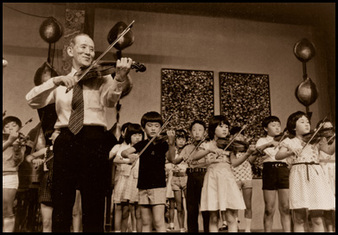The Suzuki® Method
"Every Child is capable of development; everything hinges on the way the child is brought up. Each of us is also equipped to develop ourselves, although in this case as well everything depends on the proper effort we devote to the process"
(Shinichi Suzuki)

Dr. Shinichi Suzuki
The Suzuki® Method (or Talent Education) was created after World War II by the Japanese violinist Shinichi Suzuki. It started as a violin pedagogy method, but soon was adapted to many other instruments, such as viola, cello, flute, guitar, piano and others. This method is based on Dr. Suzuki's realization that all Japanese children speak Japanese, which is the reason why it is also called the Mother Tongue Method. Dr. Suzuki observed that children around the world speak their native languages without problems. He concluded that children exposed to music since early childhood can also develop the ability to play music as they develop the ability to speak.
In the Suzuki® Method, parent involvement is crucial. The parents are the teachers at home and it is their responsibility to plan all the practice sections with the children. This is why they are required to come to all of their child’s lessons and take notes: the goal is for parents to be able to give small lessons every day during the practice time.
Also, a positive environment for practice is very important, because children learn best when encouraged and praised. They need to know that they have time to learn what is being taught to them and that the teacher and parent will never make them feel rushed. The aim of the Suzuki® Method is to create a no-fail environment, celebrating each small step. It is good to remember that the smaller the child, the smaller the steps needed, so children can spend months on the basics of posture and setup before starting the first piece in the book, the famous Twinkle, Twinkle Little Star.
Besides the weekly private lesson, group classes are an important and integral part of the Suzuki® Method: young children learn by doing and by imitating their peers. They also get motivated by seeing other children playing instruments in a joyous setting. In addition, during group classes the students have the opportunity to develop confidence by mastering review pieces, to be involved with other students who play more advanced pieces, and to develop the ability to cooperate and respect fellow students and teacher.